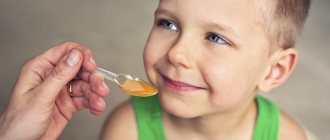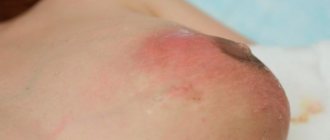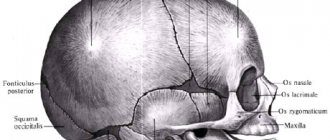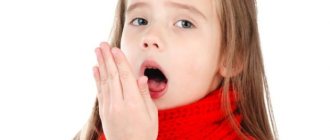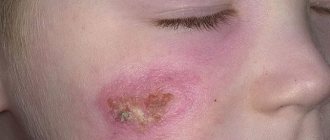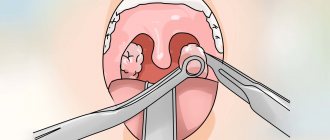Cough can start at any time and is a symptom of many respiratory diseases. During the course of the disease, various respiratory organs can become inflamed, and their changes lead to the formation of bubbling. Out of habit, adults immediately begin to take potent medications, but for children there is no need to rush to use them. There is an alternative treatment method in the form of sweet syrups based on natural ingredients and herbal infusions. The latter are widely popular in the treatment of children. Although their effect does not manifest itself as quickly as that of antitussive medications, they are safe for the child’s sick body and do not cause adverse reactions.
From this article you can learn how to cure asthmatic cough.
Areas of application
Herbal infusions are an effective and affordable remedy in the fight against cough due to influenza, acute infections of the ENT organs of viral etiology, inflammatory foci in the pharynx, trachea, bronchi and lung tissue, and bronchial asthma.
While carrying a child, all medications taken must be subjected to strict control and analysis. For example, the first collection contains the herb oregano, which can cause bleeding from the uterus and miscarriage. The fourth collection is considered to be the most gentle. But you shouldn’t use it without strict indications. Thinking that herbs are harmless and allowed in any quantity at any time is dangerous and wrong. The consequence may be various ailments due to exceeding the dose, and an allergic attack.
Contraindications, side effects and overdose
They accept fees carefully. Doctors have compiled a list of side effects that most often occur with herbal medicine.
It included allergic reactions:
- rhinitis;
- peeling of the skin;
- swelling;
- redness of the epidermis;
In some cases, the digestive system reacts sharply to taking the collection. Side effects will indicate poisoning by plant components. Patients usually complain of nausea, vomiting, bloating, heaviness and diarrhea. An overdose of breast milk also manifests itself in a similar way.
Not everyone can use such tools. There is a list of contraindications in which treatment with fees can be dangerous.
It included the following states:
- individual intolerance;
- bearing a child;
- lactation;
- early childhood (up to 3 years).
In all other cases, the collections will be excellent helpers in the fight against dry or wet cough. Infusions based on medicinal herbs will speed up the treatment process and alleviate symptoms that are unpleasant for the patient.
You are a fairly active person who cares and thinks about your respiratory system and health in general, continue to play sports, lead a healthy lifestyle and your body will delight you throughout your life
But do not forget to undergo examinations on time, maintain your immunity, this is very important, do not overcool, avoid severe physical and strong emotional overload. Try to minimize contact with sick people; if forced contact, do not forget about protective equipment (mask, washing hands and face, cleaning the respiratory tract)
It's time to think about what you are doing wrong...
You are at risk, you should think about your lifestyle and start taking care of yourself. Physical education is required, or even better, start playing sports, choose the sport that you like most and turn it into a hobby (dancing, cycling, gym, or just try to walk more). Do not forget to treat colds and flu promptly, they can lead to complications in the lungs. Be sure to work on your immunity, strengthen yourself, and be in nature and fresh air as often as possible. Do not forget to undergo scheduled annual examinations; it is much easier to treat lung diseases in the initial stages than in advanced stages. Avoid emotional and physical overload; if possible, eliminate or minimize smoking or contact with smokers.
It's time to sound the alarm!
You are completely irresponsible about your health, thereby destroying the functioning of your lungs and bronchi, have pity on them! If you want to live a long time, you need to radically change your entire attitude towards your body. First of all, get examined by specialists such as a therapist and a pulmonologist; you need to take radical measures, otherwise everything may end badly for you. Follow all the doctors’ recommendations, radically change your life, perhaps you should change your job or even your place of residence, completely eliminate smoking and alcohol from your life, and reduce contact with people who have such bad habits to a minimum, toughen up, strengthen your immunity as much as possible spend more time in the fresh air. Avoid emotional and physical overload. Completely eliminate all aggressive products from everyday use and replace them with natural, natural remedies. Do not forget to do wet cleaning and ventilation of the room at home.
When treating bronchi and lungs, doctors very often recommend the use of chest teas for children and adults, which contain medicinal plants.
There are four types of herbal teas, they include medicinal herbs, the action of which is aimed at healing the pathology of the respiratory tract.
Classification of antitussive preparations
First collection
Collection No. 1 consists of marshmallow roots (marshmallow), coltsfoot leaves (40% each), the remaining 20% is oregano. The active substances of these plants increase the body's resistance to external negative factors and have a secretolytic effect, diluting the thickness of sputum.
A collection is prescribed in case of infection and inflammation of the upper respiratory tract. They are indicated to treat children over 12 years of age and adults.
Second collection
The ingredients of collection No. 2 are as follows: thirty grams of licorice root, the same amount of crushed plantain leaves, forty grams of coltsfoot leaves. The plantain component fights inflammation, coltsfoot has an expectorant effect, and licorice softens the mucous membrane.
Used in the treatment of colds, respiratory tract infections (laryngitis, tracheitis, bronchitis). Approved for adult patients and children over twelve years of age.
Third collection
Collection No. 3 contains marshmallow, licorice, pine buds, salvia and anise seeds. The drug effectively reduces inflammation and helps cough up mucus. Decoctions based on it are used against inflammatory processes in the bronchi, larynx, and acute respiratory viral illnesses. Avoid treating children under 12 years of age with it.
Fourth gathering
Collection No. 4 contains a mixture of 15% licorice roots, 20% each of chamomile and marigold flowers, wild rosemary shoots, violet grass, and 5% mint leaves. It makes sputum less viscous, eliminates inflammation, and calms the nervous system. This breastfeeding for children is allowed after the age of three.
Kinds
Pharmaceutical companies produce several compounds; they do not have names, but simply go by numbers. Each of them contains a specific set of herbs; the pediatrician will prescribe the appropriate type for the child, based on the characteristics of the cough.
What to do when you quit smoking and have a cough, you can learn from this article.
№ 1
It consists of 80% marshmallow rhizomes and coltsfoot leaves. The rest is filled with oregano. It is prescribed for the treatment of diseases of the upper respiratory organs. This version of the herbal composition is excellent for laryngitis and tracheitis. The herbal mixture should not be used by those who have been hypersensitive to these herbs or are allergic to them.
- Marshmallow root is used in many cough syrups and mixtures. Therefore, this collection contains it to eliminate it, as well as to treat the inflamed lining of the larynx.
- Coltsfoot gently coats the throat and has a softening and expectorant effect. This plant copes well with dry coughs and relieves the acute pain that accompanies it.
- Oregano is known for its antiseptic effects. It suppresses inflammation and tones the body. Its very useful feature is its diuretic effect, which quickly rids the body of pathogenic microbes.
This article indicates how you can treat cough + during pregnancy.
№2
This remedy reduces cough, dilutes and removes phlegm, which is why it is used for pneumonia and bronchitis. Its herbal composition includes three plants: coltsfoot, as in the first version, plantain and licorice rhizomes.
Coltsfoot here can eliminate an attack of suffocation if drunk in the form of tea. It also has a blood purifying and bronchial purifying effect. And all this is possible thanks to the rich content of useful substances in its leaves:
- Vitamin C is essential for colds and can form immune cells;
- potassium, magnesium and calcium maintain the tone of the heart muscle, which is negatively affected by the disease;
- iron softens cough and improves blood composition.
You can find out what causes a dry cough at night in an adult by reading this article.
Plantain leaves contain a lot of medicinal mucus, so they improve phlegm removal. All children know this herb because they have repeatedly applied it to broken knees, knowing about its ability to heal, relieve pain, stop bleeding and inflammation, and also eliminate bacterial infections. As part of the collection, it is able to show its best healing sides.
Any cough begins first with a dry appearance, and then gradually turns into a wet one. But at first, due to the acute manifestations of attacks, the patient’s throat receives microtraumas, which can be eliminated by plantain. If the disease is accompanied by a runny nose, this herb will help. It may have an antiallergic effect. Plantain relieves swelling and improves breathing.
The baby has a dry cough without fever; this article will help you figure it out.
Licorice root is included in the composition to relieve cough. It can also be used to prevent bubbling. If you feel that the disease is approaching, you need to drink collection No. 2 for prevention in the form of tea and then the cough may bypass it. This is a strong immune-strengthening substance. But your doctor will tell you in detail how adults should take licorice root syrup correctly.
№3
Used to cleanse the bronchi of mucus. It eliminates inflammation by suppressing bacteria. It contains five medicinal herbs:
- sage;
- anise;
- marshmallow;
- pine buds;
- licorice.
The last two ingredients were described above, so let's take a closer look at the first three herbs.
Sage leaves can have a calming and softening effect on coughs, as well as relieve inflammation that occurs with them. They are able to stop bleeding and restore the throat mucosa. They also have an astringent effect.
You can find out what to take for a child with a dry cough by reading this article.
Pine buds are rich in essential oil, resin, vitamin C and other beneficial microelements. They produce a vasodilator and disinfectant effect. Can have a diuretic effect.
№4
This is a powerful herbal mixture. All its components are comprehensively capable of providing antibacterial, antispasmodic and anti-inflammatory effects. They are involved in the rapid removal of sputum from the bronchi and lungs. This collection differs from the others in its multi-component nature. It contains six herbs at once:
- chamomile;
- calendula;
- mint leaves;
- wild rosemary;
- violet;
- liquorice root.
- Chamomile flowers have an antiseptic and calming effect. They contain tannins, azulene, anthemisic acid and glycoside.
- Violet has a sedative and anti-inflammatory effect on the body. It contains vitamin C, flavonoids, glycosides and saponins.
- Calendula flowers have a powerful bactericidal effect. The flavonoids, acids, saponins, tannins and carotenoids they contain can make sputum less viscous.
- Ledum has an expectorant effect.
- Mint leaves have a sedative effect. They contain menthol and essential oils.
This article will help you figure out what to do when a one-year-old child has a wet cough.
Treatment of babies
Not every chest cough mixture is recommended for children. When choosing a herbal remedy, you need to take into account the age factor, nature, and intensity of the ailment accompanying the underlying disease pathology.
Combined formulations are prohibited from brewing and giving to infants and one-year-old children, and it is recommended to refrain from using some for up to three years. There is a high probability of an allergic response of the body in a child 2 years of age or younger to one of the components of the breast milk collection. It is much safer to treat cough with a single-component infusion: thyme, chamomile, licorice, coltsfoot or fireweed. For example, a small spoon of dry thyme is infused in three hundred milliliters of boiled water. Cool and water the baby according to this scheme: a teaspoon four times a day. For children over one year of age, formulations containing a minimum amount of ingredients are best suited.
If you are sure that the baby is not allergic to the ingredients of the third and fourth drugs, you can prepare a breast mixture with these numbers for coughs for children after five years. For example, the components of wild rosemary are highly allergenic. If you notice tissue swelling, skin rash or flushing with itching, headaches and loss of balance, stop treatment immediately.
Modern pharmacy collections of medicinal plants are sold in packaged form. The raw materials in them are optimally cut, the bags are convenient to infuse like tea. If you buy classic packaging in a cardboard box, the mixture is better preserved in an airtight glass or ceramic container.
How to take the collection correctly
For therapy to be safe and effective, you must follow some simple rules.
- Follow the instructions for preparing the decoction on the package. If your doctor recommends other brewing methods and dosage based on your child’s characteristics, listen to him.
- You need to drink the product before meals, in small sips, slowly. But if the child is very small, and in addition, he has problems with the gastrointestinal tract, it is best to drink an infusion of reduced concentration and dose, and certainly after meals.
- Make a schedule. Approximately the same amount of time should pass between doses.
- Healing drinks can be alternated (of course, after consulting a doctor) so that the child’s body receives more beneficial substances.
Cough tea, which has an expectorant effect, cannot be taken simultaneously with antitussive medications - they block the cough center of the brain and/or reduce sputum production. The discharge of sputum will be difficult, it will begin to stagnate, and because of this, the infectious agent can spread throughout the entire respiratory system.
Table - Age norms for taking breast milk
| Child's age | Dosage | Reception per day |
| 1-3 years | 1 tablespoon | 3-4 times |
| 3-10 years | 2 tablespoons | 4 times |
| from 10 years | 1/3 cup | 3 times |
Children over three years old can add a little honey, jam or lemon juice to the drink.
Breast collection is often used for inhalation. The prepared infused decoction should be poured into the reservoir of the inhaler (nebulizer) and the child should be allowed to breathe for 7-8 minutes. Inhalations do not help only with a dry cough.
Brewing method
There is a universal method of preparing medicine based on herbal collection. First, all components are thoroughly mixed. A tablespoon of raw materials from any collection is placed in an enamel bowl. Herbs from the first and second collections are poured with a glass of water at room temperature, from the third and fourth - with slightly cooled boiled water. The container is steamed under the lid for about twenty-five minutes after boiling. This method extracts more medicinal substances from plant parts. The infusion should stand for three quarters of an hour until it cools. It is then filtered through a filter and squeezed out. Add two hundred milliliters of heated water to the resulting medicine. Herbal sachets are infused in boiled water for a quarter of an hour. Take the drink prepared in both ways warm, after mixing it.
Anti-inflammatory herbs
If your baby has recently started coughing, pay attention to the following:
- chamomile;
- Melissa;
- thyme;
- elecampane;
- eucalyptus;
- St. John's wort;
- sage;
- marshmallow;
- thermopsis;
- mint;
- liquorice root.
In the pharmacy you can find medicinal lozenges and syrups containing some of the plants from this list. There you can also buy sachet bags, which are convenient to brew like tea. At worst - individual dried parts of plants. They need to be processed longer. Make decoctions and infusions. In most cases, this is a teaspoon per glass of boiling water. Cover with a lid and wait an hour or two. If the child knows how to do this, then you can only gargle. If it was just inflammation, then the pain will subside and the redness will subside significantly.
Method of use and dose
These herbal preparations are prescribed only for productive cough. They help cleanse the air ducts from stagnant viscous secretions. It is important to strictly adhere to the recommendations for use and optimal dosage. The baby should be given water before meals, one sip at a time, slowly. The medication should be taken at the same time every day. Babies under the age of five with gastrointestinal disorders should receive a less concentrated infant formula and consume it after meals. Do not give breast milk at the same time as medications that suppress the cough reflex. This threatens coughing disorders and mucus stagnation.
The taste of herbs is not always pleasant, often bitter, and smells excessively of medicine. For toddlers after three years, it can be made tastier by adding a spoonful of honey or jam.
A wet cough can be treated with chest inhalations. The prepared liquid is placed in a nebulizer, the baby breathes in pairs for eight minutes.
| Age range | Dosage | Amount of daily intake |
| From one year to three years | Tablespoon | Four times |
| From three to ten years | A couple of tablespoons | Four times |
| After a decade | A third of a glass | Three times |
Breastfeeding during pregnancy
Pregnant women are the only group that receives chest collection No. 1, 2, 3, 4 for cough
practically does not fit. Collection No. 1 includes oregano, and collection No. 3 includes anise. Therefore, they are in no way suitable for women who are pregnant.
Collections No. 2 and No. 4 are combined by a common component, which is not recommended for pregnant women. This is licorice root. But in collection No. 4 its share is much smaller. Therefore, No. 4 is the only collection acceptable for use during pregnancy. Doctors have different opinions on this matter, but if the attending physician allows the use of collection No. 4, then his opinion should be listened to.
Important! For women who are breastfeeding, all breastfeeding is absolutely contraindicated. There are no options here. This is due to the fact that the components of the collection can pass through the mother’s milk to the baby. And breastfeeding, as you know, is contraindicated for children under 12 years of age.
Therapy for nonproductive cough
The measures described above concern the wet nature of the cough, when the patient coughs up mucus, but this is complicated by its high viscosity. The collections are designed to facilitate the release of secretions, dilute it, soften the airways, and prevent infection in the lower sections.
In the case of a dry cough, the bronchi and larynx are irritated by attacks, but the ducts are not cleared. The composition of the chest mixture for dry cough includes various parts of chamomile, thyme, eucalyptus, and sage. Its action is aimed at reducing the cough reflex, stimulating the secretion and release of secretions, reducing irritation and inflammation in the air ducts. The composition also destroys pathogenic microflora in the throat and other parts. The decoctions are drunk and used to gargle.
Salvia leaves have all the necessary qualities to treat dry cough. They are full of vitamins and acids and facilitate expectoration. For children after their second birthday and older children, you can prepare the following composition. Mix a tablespoon of sage with a glass of boiling water (200 ml), put it on the fire and leave to simmer for about five minutes. Then it stands for another quarter of an hour. The child should be given this warm decoction every day until the condition improves.
You can pour a bag of chopped sage or a large spoonful of it with milk and boil. Allow to cool and repeat the procedure. Filter the mixture, add a little butter to it, and let sit for a while. Let's drink it warmed up, shortly before going to bed. After your child's third birthday, sweeten the drink with honey or sugar.
For children who already know how to safely suck lollipops and marshmallows (from three, and preferably from six years old), you can give sage in this form.
Doctor-approved manipulations will help make your cough moist and speed up recovery:
- applying compresses;
- sternum massage;
- rinsing;
- warming up;
- inhalation.
A combination of effective recipes and procedures will lead to a quick and complete recovery. During the therapy process, support your baby with complex vitamins, quality nutrition, and walks. Prevent hypothermia and overwork with properly selected seasonal clothing and feasible exercise.
General indications for chest compressions
In short, it is best used for wet coughs that have not yet begun to cause complications. But in fact, the range of indications for these drugs is much wider. They are quite effective for more serious diseases.
A complete list of diseases for which breastfeeding should be used:
- acute and chronic bronchitis, including in children;
- obstructive bronchitis;
- laryngitis, including in children;
- bronchial asthma;
- tracheitis, tracheobronchitis, pharyngitis;
- chronic obstructive pulmonary disease (COPD);
- influenza, ARVI and other diseases that are accompanied by the release of sputum in the respiratory tract;
- pneumonia and tuberculosis.
The use of breast collection can reduce the intensity of inflammatory processes, facilitate the removal of sputum, and improve expectoration. Also, the components of chest packs relax the muscles of the respiratory tract and expand the bronchi.
Of course, in case of serious illnesses, you cannot rely only on breastfeeding. It should be part of a whole range of medications used. In addition, the use of any remedy should be discussed in advance with your doctor.
